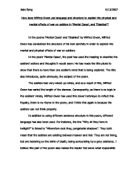World War One started in August 1914. British people were feeling positive at the time. They were feeling enthusiastic and patriotic. The partners, friends and family of the "heroic" soldiers all thought they would be home by Christmas. Rupert Brooke and Wilfred Owen are famous poets from the time. Rupert Brooke at the start of the war wrote 'The Soldier'. In 'The Solider' it shows going to war is heroic but some lines are shockingly ironic. During the war, Wilfred Owen wrote two famous poems named 'Anthem for Doomed Youth' and 'Dulce et Decorum Est'. These poems showed more of the reality of the war. A difference between the 2 poets was that Wilfred Owen saw frontline trench warfare and Rupert Brooke did not.
A year into the war, Rupert Brooke wrote 'The Soldier'. His main subject was to tell the people how heroic the soldiers were going to war. He wrote the poem as if he was a soldier himself. "If I should die, think only this of me: That there's some corner of a foreign field". This line is saying that if he dies at least he died for England.

This is a preview of the whole essay
Peer Reviews
Here's what a star student thought of this essay
Quality of writing
The Quality of Written Communication is average. With a limited use of punctuation point, this candidate may struggle to reach higher than a B grade. Using a variety of punctuation shows confidence and an enthusiastic flair in essay writing, and this is what is missing from this essay. Also, the sentence syntax can prove quite clunky, which can be corrected if the candidate re-reads and corrects any spelling/grammatical errors before they close the exam booklet/submit the final draft of their coursework.
Level of analysis
The Level of Analysis is wholly representative of someone expecting to achieve a high B grade at GCSE. There is a fine analysis of how the poems are constructed in terms of language and imagery, but the answer is a little less focused particularly on structure (the comments about 'Anthem for Doomed Youth' being a sonnet are not sufficiently explored; sonnets are not conventionally just for the expression of love and happiness; more rather any intense emotion with it's fourteen unbroken lines). The candidate comments on the similes and onomatopoeia, showing a level of understanding that suggests they can successfully analyse the use of language to shape meaning and attitude. However, more empasis could be explored particularly in phrases like "like a devil's sick of sin" and "white eyes writhing in his face" suggest elemetns of the supernatural, and that the reality of war was not sweet or honourable, but harrowing and haunting, as if Owen is experiencing a nightmare. The candidate conclusion nicely draws everything they had previously mentioned together, as well as clearly underlining the contextual differences that influences both writers into writing their respective poems. Conclusion like these are good, particularly as this one focuses directly on the quesiton. Well-structured essays will directly reference the question regularly throughout and particularly in their conclusion.
Response to question
This question asks candidates to consider how the attitude to war changed and how the poets exemplified their opinions and beliefs about war in their poetry. This candidate exercises an excellent focus on the question, consistently referring back to how the poetic and linguistic devices are used by the poets contribute and how the attitudes to war changed over the four years. There is a very clear systam by which the candidate adheres, commenting on poems' purpose, imagery, effect onn reader (this is resonant throughout), and linguistic devices like alliteration and irony. It is imperative in this question that candidate realise when the poems were written, as this is key to answering how the attitudes had changed over time and, realising that at the start of the war both sides were extrememly patriotic yet towards the end felt less so, is a very good contextual appreciation (though, it must not be said, as this candidate has done in their conclusion, that there was a lack of heroism as Wilfred Owen was his most heroic from 1917 onwards).








